备考指南:十句最常用的雅思地道口语
雅思口语9分地道俚语
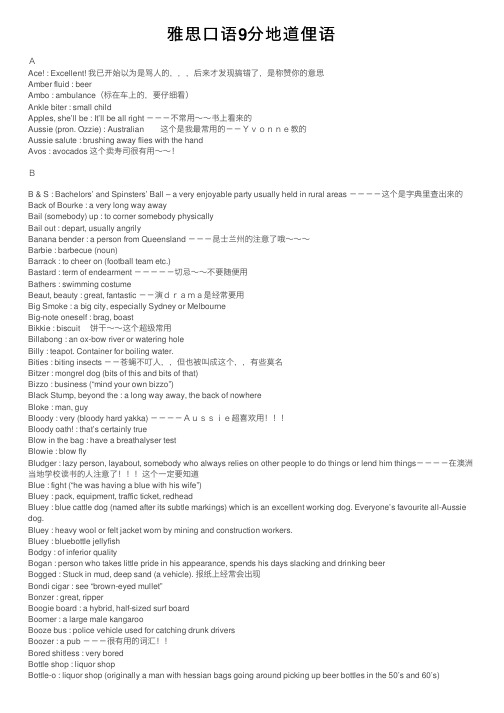
雅思⼝语9分地道俚语AAce! : Excellent! 我已开始以为是骂⼈的,,,后来才发现搞错了,是称赞你的意思Amber fluid : beerAmbo : ambulance(标在车上的,要仔细看)Ankle biter : small childApples, she’ll be : It’ll be all right ---不常⽤~~书上看来的Aussie (pron. Ozzie) : Australian 这个是我最常⽤的--Yvonne教的Aussie salute : brushing away flies with the handAvos : avocados 这个卖寿司很有⽤~~!BB & S : Bachelors’ and Spinsters’ Ball – a very enjoyable party usually held in rural areas ----这个是字典⾥查出来的Back of Bourke : a very long way awayBail (somebody) up : to corner somebody physicallyBail out : depart, usually angrilyBanana bender : a person from Queensland ---昆⼠兰州的注意了哦~~~Barbie : barbecue (noun)Barrack : to cheer on (football team etc.)Bastard : term of endearment -----切忌~~不要随便⽤Bathers : swimming costumeBeaut, beauty : great, fantastic --演drama是经常要⽤Big Smoke : a big city, especially Sydney or MelbourneBig-note oneself : brag, boastBikkie : biscuit 饼⼲~~这个超级常⽤Billabong : an ox-bow river or watering holeBilly : teapot. Container for boiling water.Bities : biting insects --苍蝇不叮⼈,,但也被叫成这个,,有些莫名Bitzer : mongrel dog (bits of this and bits of that)Bizzo : business (“mind your own bizzo”)Black Stump, beyond the : a long way away, the back of nowhereBloke : man, guyBloody : very (bloody hard yakka) ----Aussie超喜欢⽤Bloody oath! : that’s certainly trueBlow in the bag : have a breathalyser testBlowie : blow flyBludger : lazy person, layabout, somebody who always relies on other people to do things or lend him things----在澳洲当地学校读书的⼈注意了这个⼀定要知道Blue : fight (“he was having a blue with his wife”)Bluey : pack, equipment, traffic ticket, redheadBluey : blue cattle dog (named after its subtle markings) which is an excellent working dog. Everyone’s favourite all-Aussie dog.Bluey : heavy wool or felt jacket worn by mining and construction workers.Bluey : bluebottle jellyfishBodgy : of inferior qualityBogan : person who takes little pride in his appearance, spends his days slacking and drinking beerBogged : Stuck in mud, deep sand (a vehicle). 报纸上经常会出现Bondi cigar : see “brown-eyed mullet”Bonzer : great, ripperBoogie board : a hybrid, half-sized surf boardBoomer : a large male kangarooBooze bus : police vehicle used for catching drunk driversBoozer : a pub ---很有⽤的词汇!!Bored shitless : very boredBottle shop : liquor shopBottle-o : liquor shop (originally a man with hessian bags going around picking up beer bottles in the 50′s and 60′s)Bottler : something excellentBottling, his blood’s worth : he’s an excellent, helpful bloke.Bounce : a bullyBourke Street, he doesn’t know Christmas from : he’s a bit slow in the head. (Bourke Street is a brightly lit Melbourne street) Bowl of rice, not my : not my cup of tea; I don’t like itBrass razoo, he hasn’t got a : he’s very poorBrekkie : breakfastBrick shit house, built like a : big strong blokeBrickie : bricklayerBrisvegas : Brisbane, state capital of QueenslandBrizzie : Brisbane, state capital of QueenslandBrown-eyed mullet : a turd in the sea (where you’re swimming!)Brumby : a wild horseBuck’s night : stag party, male gathering the night before the weddingBuckley’s, Buckley’s chance : no chance (“New Zealand stands Buckley’s of beating Australia at football”)Budgie smugglers : men’s bathing costume 是指长的Bull bar : stout bar fixed to the front of a vehicle to protect it against hitting kangaroos (also roo bar)Bundy : short for Bundaberg, Queensland, and the brand of rum that’s made thereBunyip : mythical outback creatureBush : the hinterland, the Outback, anywhere that isn’t in town 记得以前MRS。
雅思 口语 必背 精简

1. What do you think are the main causes of road accidents?2. Do you know what to do in case of emergency?3. Does your name have any special meaning?4. Where were you come from?5. What kind of landscape surrounds your hometown?6. Will your life change a lot after you immigrate to ABC?7. What is the difference between Beijing and your hometown?8. What are the main places of interest in your hometown?9. What is the climate like in your hometown?10. What is the character of the people like in the region where you live?11. What are the differences in accent between the people of your hometown and Beijing?12. What is people"s favorite food in your region?13. How do you make dumplings?14. What do you do during the Spring Festival?15. Why is the Spring Festival so important to Chinese people?16. Can you describe one of the main festivals celebrated in your country?17. Tell me something about the Lantern Festival.18. Tell me something about the Qing Ming Festival.19. Tell me something about the customs of your country.20. How long have you lived in Beijing?21. What is the weather like in Beijing?22. How do you compare the climate in Beijing with that in your hometown?23. What place in Beijing do you like best? Why ?24. Which is the worst place you"ve been to China?25. Which is the best place you"ve been to China?26. What places in Beijing should a foreigner visit? Why?27. What are the major social problems in Beijing? How can they be solved?28. What is the biggest problem China faces?29. What places in Beijing should a foreigner visit? Why?30. Could you tell me something about your family?31. Have you any children?32. What is your child"s name? Does his name have a meaning?33. What does your wife/husband do?34. When did you get married?35. Describe your wedding.36. How have weddings changed in recent years?37. Are there any special customs about wedding in your region?38. Describe a traditional wedding ceremony.39. Where did you go for your honeymoon?40. Did you have to ask for permission from your parents before you got married?41. Is it acceptable for couples to live together without marrying?42. Where do you think a newly couple should live? Living with their parents or on their own?43. What responsibilities should a couple take?44. How do Chinese usually celebrate birthdays?45. Are there any traditions concerning the birth of a baby?46. What kind of parent do you intend to be?47. What do you think of One-Child Policy in China?48. Why do people in China traditionally want to have a son?49. What difficulties do Chinese farmers have concerning their old age?50. What do you think needs to be done in order to relieve the farmer"s worries?51. What hope or fears do you have for your children?52. What sort of culture do you hope your child will grow up in?53. Are you going to bring up your child differently from the way you were brought up? How?54. Do you enjoy shopping?55. Who does most of the shopping in your family?56. What are you good at cooking? What is your favorite dish?57. Who does most of cooking in your family?58. Is there *** discrimination in China?59. How do you sum up women"s conditions in China?60. What are the causes of *** discrimination?61. Should government pay certain salaries to those housewives? Why or why not?62. Would you want your wife to continue with her career or to stay at home taking care of the household after you get married?63. Have you ever wished to be one of the opposite ***? Why (why not)?64. What would you do if your next-door neighbour were noisy nearly all the time?65. Do you have a lot of friend?66. What does friendship mean to you? What kind of people do you make friend with?67. What is your major?68. How do you like your major?69. When and where did you graduate? What qualifications have you obtained?70. Do you still remember your school days?71. What impressed you most when you were at university?72. Which is the best university in your country?73. Could you sum up your own study habits in a few points?74. What do you think of the practice of setting up key schools in primary and secondary school education in China?75. Do you think the subjects you are studying today are relevant to present-day society? Why ?76. What do you think education should be? Should it be a process of learning what is useful for your future life or should it be simply learning for enjoyment? Why?77. What do you do for a living?78. What do you do in the office every day?79. Since your job seems too professional to me, could you explain it in detail?80. What are your job prospects?81. If you had the opportunity to change your job, what would you do with it?82. Do you have any ambitious?83. Will any possible future changes affect your job in any way?84. What are your spare time interests?85. How do you spend your weekends?86. What is your favorite sport? What are the rules?87. What is the most popular sport in your country?88. What are the sporting facilities like in your university/Beijing?89. What do you know about Qigong? Do you believe in Qigong?90. What do you do in your spare time?91. Do you often read newspapers? If not, why ones do you read?92. What do you think of computer?93. Do you think computer has changed our life so much?94. Do you often go to the cinema/theatre?95. What kind of films do you like best?96. Do you often watch TV? What is your favorite program?97. Do you think watching TV too much is a waste of time?98. What kind of music do you enjoy?99. Who is your favorite film star? Will you describe him/her to me?100. Do you enjoy travelling?101. Where have you been travelling to? Which place interested you most? 102. Do you smoking?103. Do you think smoking is a problem that needs special attention and has to be solved? If so, why?104. What do you know about ABC?105. What problem do you think you will have in ABC?106. How will you overcome the difficulties?107. Do you think you will be able to cope with English-demands of your intended study program in ABC?108. What difficulties do you think you’ll encounter in your studies in ABC? 109. Can you imagine what life in Britain/Canada/Australia/London, etc. would be like?110. How will you fare in Britain/Canada/Australia, etc. without your family? 111. What do you intend to study?112. Which university are you going to study at?113. Why did you choose this university?114. Where are you going to study in ABC?115. What are you plans in ABC?116. What is your research proposal all about?117. What do you hope for most from your study abroad?118. Will your study abroad help your job prospects after come back to China? 119. Should you study more theory or do more practice? Give your reasons, please. 120. What kind of differences in the cultures are you expecting between China and the ABC?121. How will your study in Britain benefit your work in China when you come back to China?122. How will your study in Britain benefit your work in China when you come back to China?123. What do you intend to do after you finish studying?124. What will be your main problem when you are study in a foreign country? 125. What problem can you foresee in the future when you come back to China? 126. Will there be any adjustment problems in your life when you come back to China? If so, what are they?127. Will you have to make any changes in your work/life when you come back to China?128. Do you think there will be a gap between your knowledge gained in China and the level of knowledge you are going to encounter on arrival? If so, what will it be? 129. What do you think of the future of China keeps an open policy?130. What do you regard as the most significant events in your country’s recent history?131. Are there any special places you want to see in Canada? What are they? 132. What do you especially want to do in Canada?133. How do you like your life in ABC University?134. What do you think of the training in the university?135. In what way do you think university training is helpful or falls short?136. What aspect of English do you find the most difficult?137. Do you find American English easier to understand than Britain English? 138. What sports are played in your country?139. Could you describe the traditional architecture of your country?140. What role dose religion play in everyday life in your country?141. What would you regard as the most significant events in your country"s recent history?142. How aware do you think people are nowadays about environmental issues? 143. Could you tell me why you chose to study at the university of ABC?144. What role dose tourism play in your country"s economy?145. How serious is unemployment in your country?146. In your opinion, what are the most serious problems associated with modern life?147. What do you think have been the most important changes in your field over the past 5 years?148. What are you going to major in ?149. Are you going to do your own cooking when you are at university?150. Some local students feel that overseas students get preferential treatment. What is your opinion?151. Do you think you will be able to cope with the English-language demands of your intended program?。
雅思口语之常用句型总结
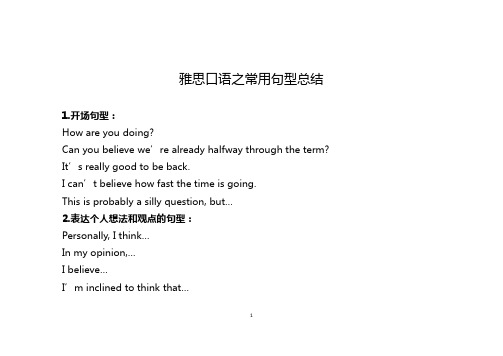
雅思口语之常用句型总结1.开场句型:How are you doing?Can you believe we’re already halfway through the term? It’s really good to be back.I can’t believe how fast the time is going.This is probably a silly question, but…2.表达个人想法和观点的句型:Personally, I think…In my opinion,…I believe…I’m inclined to think that…1Personally, I would recommend…3表达喜欢和不喜欢、喜好和偏好的句型:I really enjoy…I’m passionate about…I can’t stand…I’m not particularly fond of…I’m not particularly fond of doing…4.表达原因和理由的句型:The reason why I like/dislike…is because…One of the reasons why I enjoy…is that…One of the reasons why I find it difficult to do…is because…One of the reasons why I prefer…to…is because…5.表达经历和感受的句型:I remember when I first…It was a great experience.2The last time I…was a disaster.When I was younger, I always used to…It was a lot of fun.One of the best things about…is that you can…It makes me feel really good.6.表达建议和意见的句型:In my opinion, you should…Personally, I would recommend…If I were you, I would…I think it would be a good idea to…Personally, I would avoid doing…because…3。
雅思口语好句
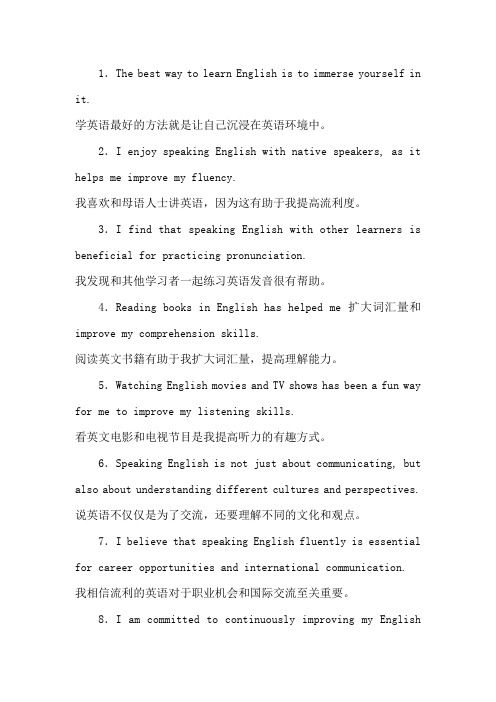
1.The best way to learn English is to immerse yourself in it.学英语最好的方法就是让自己沉浸在英语环境中。
2.I enjoy speaking English with native speakers, as it helps me improve my fluency.我喜欢和母语人士讲英语,因为这有助于我提高流利度。
3.I find that speaking English with other learners is beneficial for practicing pronunciation.我发现和其他学习者一起练习英语发音很有帮助。
4.Reading books in English has helped me扩大词汇量和improve my comprehension skills.阅读英文书籍有助于我扩大词汇量,提高理解能力。
5.Watching English movies and TV shows has been a fun way for me to improve my listening skills.看英文电影和电视节目是我提高听力的有趣方式。
6.Speaking English is not just about communicating, but also about understanding different cultures and perspectives. 说英语不仅仅是为了交流,还要理解不同的文化和观点。
7.I believe that speaking English fluently is essential for career opportunities and international communication.我相信流利的英语对于职业机会和国际交流至关重要。
8.I am committed to continuously improving my Englishlanguage skills for personal and professional development. 我致力于不断提升自己的英语水平,以促进个人和职业发展。
雅思口语100句常用表达
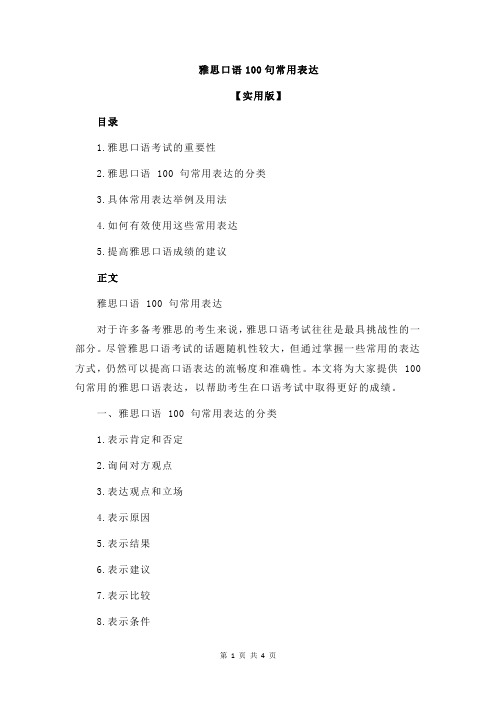
雅思口语100句常用表达【实用版】目录1.雅思口语考试的重要性2.雅思口语 100 句常用表达的分类3.具体常用表达举例及用法4.如何有效使用这些常用表达5.提高雅思口语成绩的建议正文雅思口语 100 句常用表达对于许多备考雅思的考生来说,雅思口语考试往往是最具挑战性的一部分。
尽管雅思口语考试的话题随机性较大,但通过掌握一些常用的表达方式,仍然可以提高口语表达的流畅度和准确性。
本文将为大家提供 100 句常用的雅思口语表达,以帮助考生在口语考试中取得更好的成绩。
一、雅思口语 100 句常用表达的分类1.表示肯定和否定2.询问对方观点3.表达观点和立场4.表示原因5.表示结果6.表示建议7.表示比较8.表示条件9.表示时间10.表示地点二、具体常用表达举例及用法1.表示肯定和否定- Absolutely, not.绝对不是。
- I"m used to it.我习惯了。
- Are you sure? 你能肯定吗?2.询问对方观点- As soon as possible.尽快。
- Believe me.相信我。
- Are you coming with me? 你跟我一起去吗?3.表达观点和立场- Call me tomorrow.明天打电话给我。
- Can you speak slowly? 请说得慢些好吗?4.表示原因- There are three reasons for this。
- The reasons for this are as follows。
- The reason for this is obvious。
5.表示结果- The reason for this is not far to seek。
- The reason for this is that。
6.表示建议- I"d like to talk about a special experience I had。
雅思口语常用的经典句型
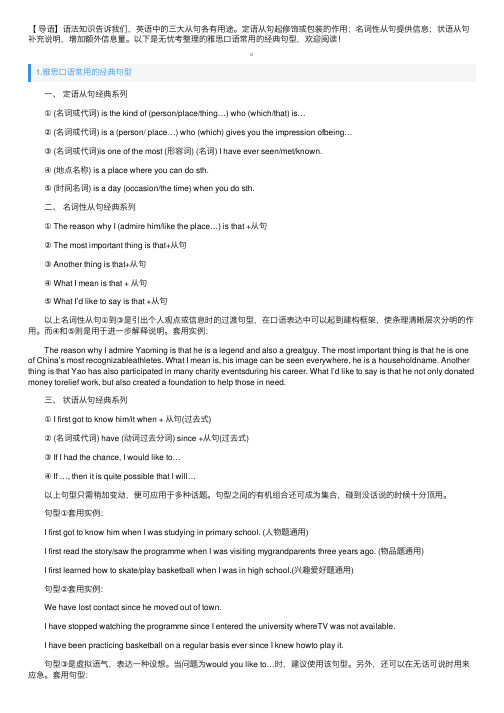
【导语】语法知识告诉我们,英语中的三⼤从句各有⽤途。
定语从句起修饰或包装的作⽤;名词性从句提供信息;状语从句补充说明,增加额外信息量。
以下是⽆忧考整理的雅思⼝语常⽤的经典句型,欢迎阅读!1.雅思⼝语常⽤的经典句型 ⼀、定语从句经典系列 ① (名词或代词) is the kind of (person/place/thing…) who (which/that) is… ② (名词或代词) is a (person/ place…) who (which) gives you the impression ofbeing… ③ (名词或代词)is one of the most (形容词) (名词) I have ever seen/met/known. ④ (地点名称) is a place where you can do sth. ⑤ (时间名词) is a day (occasion/the time) when you do sth. ⼆、名词性从句经典系列 ① The reason why I (admire him/like the place…) is that +从句 ② The most important thing is that+从句 ③ Another thing is that+从句 ④ What I mean is that + 从句 ⑤ What I’d like to say is that +从句 以上名词性从句①到③是引出个⼈观点或信息时的过渡句型,在⼝语表达中可以起到建构框架,使条理清晰层次分明的作⽤。
⽽④和⑤则是⽤于进⼀步解释说明。
套⽤实例: The reason why I admire Yaoming is that he is a legend and also a greatguy. The most important thing is that he is one of China’s most recognizableathletes. What I mean is, his image can be seen everywhere, he is a householdname. Another thing is that Yao has also participated in many charity eventsduring his career. What I’d like to say is that he not only donated money torelief work, but also created a foundation to help those in need. 三、状语从句经典系列 ① I first got to know him/it when + 从句(过去式) ② (名词或代词) have (动词过去分词) since +从句(过去式) ③ If I had the chance, I would like to… ④ If …, then it is quite possible that I will… 以上句型只需稍加变动,便可应⽤于多种话题。
雅思口语中的经典句型
【导语】要想在雅思⼝语考试中取得好成绩,就离不开⽇常的积累。
也要多了解⼀些雅思⼝语常⽤句型,然后多背诵、练习。
以下是⽆忧考整理的雅思⼝语中的经典句型,欢迎阅读!1.雅思⼝语中的经典句型 1. I am a student studying in Wuhan University, and I major in Computer Science. 我是武汉⼤学的学⽣,我的专业是计算机科学 2. I chose my major because I thought it was popular, so it will be easier for me to find a job after graduation. 我之所以选择这个专业,是因为我觉得它很热门,毕业以后我会⽐较容易找到⼀份好⼯作。
3. I came from Hubei province. 我来⾃湖北省。
4. I love my hometown because there are a lot of places of interest and delicious food here. 我喜欢我的家乡,因为这⾥有许多的名胜古迹,还有各种各样的美⾷。
5. The most famous attraction is Yellow Crane Tower. It was built hundreds of years ago besides the Yangtze River. 最出名的旅游景点是黄鹤楼,⼏百年前它被建于长江边。
6. Every year millions of tourists visit the tower coming from different parts of China. 每年都有⼏百万来⾃于全国各地的游客参观黄鹤楼。
7. And the most welcomed snack is the hot dry noodle, even though some outlanders do not appreciate it at the beginning, they will love it finally. 的⼩吃是热⼲⾯,虽然有⼀些外地来的⼈刚开始并不喜欢吃,但是⼀段时间以后他们会爱上热⼲⾯。
31种雅思口语高分必背公式
31种雅思口语高分必背公式雅思口语是评估考生英语口语能力的重要考试科目之一。
要取得高分,考生需要具备丰富的词汇量、流利的语言表达能力以及灵活运用语法的能力。
为了帮助考生提高口语表达水平,本文将介绍31种雅思口语高分必背公式,供考生参考。
1. Talking about preferences:I’m really into + 名词 (如:I'm really into reading books.)2. Talking about experiences:The most memorable/exciting/interesting experience I had was + 句子 (如:The most memorable experience I had was when I went skydiving.)3. Giving examples:For example, + 句子 (如:For example, I enjoy playing basketball, swimming, and hiking.)4. Expressing opinions:In my opinion, + 句子 (如:In my opinion, traveling is a great way to broaden one's horizons.)5. Expressing preferences:I prefer + 名词/动名词 (如:I prefer swimming to jogging.)6. Describing people or things:He/She/It is + 形容词 (如:He is tall and handsome.)7. Making comparisons:In comparison with + 名词/动名词, + 句子 (如:In comparison with traditional shopping, online shopping is more convenient.)8. Expressing agreement:I agree with + 句子 (如:I agree with the statement that exercise is important for one's health.)9. Expressing disagreement:I disagree with + 句子 (如:I disagree with the idea that money brings happiness.)10. Describing changes:There has been a significant + 形容词/noun (如:There has been a significant increase in the number of people using smartphones.)11. Giving reasons:The reason why + 句子 is that + 原因 (如:The reason why I chose to study abroad is that I want to experience different cultures.)12. Describing trends:There has been a steady/increasing/decreasing + 名词 (如:There has been a steady rise in global temperatures.)13. Talking about advantages:One of the advantages of + 名词/动名词 is that + 句子 (如:One of the advantages of living in a big city is that there are more job opportunities.)14. Talking about disadvantages:One of the disadvantages of + 名词/动名词 is that + 句子 (如:One of the disadvantages of living in a big city is the high cost of living.)15. Expressing likelihood:It is likely/probable that + 句子 (如:It is likely that he will pass the exam.)16. Expressing certainty:I am certain/sure/confident that + 句子 (如:I am confident that I will achieve my goals.)17. Giving suggestions:I would suggest/recommend + 动名词/动词原形 (如:I would suggest taking a break and relaxing.)18. Expressing regrets:I regret + 动名词/动词-ing (如:I regret not studying harder for the exam.)19. Giving instructions:First, + 句子. Then, + 句子 (如:First, wash the vegetables. Then, cut them into small pieces.)20. Expressing importance:It is important/crucial/vital to + 动词原形 (如:It is important to maintain a healthy lifestyle.)21. Expressing consequences:If + 句子, + 结果 (如:If you don't study, you will fail the exam.)22. Expressing purpose:The purpose of + 名词/动名词 is to + 动词原形 (如:The purpose of education is to equip students with knowledge and skills.)23. Expressing condition:If + 句子, + 句子 (如:If it rains, we will stay indoors.)24. Expressing possibilities:There is a possibility/chance that + 句子 (如:There isa possibility that he will be promoted.)25. Expressing alternatives:Instead of + 动名词/动词-ing, + 句子 (如:Instead of driving, I prefer cycling to work.)26. Expressing reasons:The reason for + 名词/动名词 is that + 句子 (如:The reason for the traffic jam is that there is construction on the road.)27. Expressing consequences:As a result of + 名词/动名词, + 句子 (如:As a result of the pandemic, many people lost their jobs.)28. Expressing possibilities:It is possible/probable that + 句子 (如:It is possible that she will arrive late.)29. Giving examples:Take + 名词/动名词 for example (如:Take environmental pollution for example.)30. Expressing time:In + 一段时间, + 句子 (如:In recent years, people have become more aware of the importance of environmental protection.)31. Expressing contrast:On the one hand, + 句子. On the other hand, + 句子 (如:On the one hand, technology has made our lives more convenient. On the other hand, it has also led to reliance and decreased interpersonal connections.)通过学习和熟练运用这些雅思口语高分必背公式,考生将能够在口语表达中更加流利地使用适当的词汇和句子结构,从而获得更高的口语分数。
雅思口语句型结构大全
雅思口语句型结构大全以下是一些常见的雅思口语句型结构:1.前言+主题+理由- One reason why I believe/feel/think...(主题) is that...(理由).2.前言+问题/情景+主题+理由3.前言+问题/情景+主题+简要解释- In response to...(问题/情景), I would say that...(主题) because...(简要解释).4.前言+问题/情景+主题+具体例子- Regarding...(问题/情景), I have had personal experience that supports the idea of...(主题). For example,...5.前言+问题/情景+对比- However, on the other hand, there are some people who argue that...(其他观点). In my opinion, though, I believe...(主题) is still more preferable.6.前言+比较+结论7.前言+两种观点对比- On one hand, some people argue that...(观点 A). On theother hand, others believe that...(观点 B). Personally, I agree with/oppose to...(主题).8.前言+父母观点+个人观点- My parents have always believed that...(父母观点). However,I tend to have a different opinion on...(主题).9.前言+现象描述+个人看法- It is often said/observed that...(现象描述). From my perspective, I think/feel...(个人看法).10.前言+选择题+理由- If I am asked to choose between...(选项 A) and...(选项 B), I would definitely choose...(选项 A) because...(理由).这些句型结构可以根据具体的题目和话题进行适当的调整和变化。
雅思口语常用120句型
雅思口语常用120句型雅思口语考试中常用的120个句型如下:1. In my opinion,…。
2. From my perspective,…。
3. I believe that…。
4. Personally, I think…。
5. It seems to me that…。
6. I would argue that…。
7. It is often said that…。
8. Many people claim that…。
9. It is widely believed that…。
10. It is commonly thought that…。
11. According to research/statistics/studies…。
12. It is a well-known fact that…。
13. It goes without saying that…。
14. It is un deniable that…。
15. There is no doubt that…。
16. It is worth mentioning that…。
17. I must admit that…。
18. I couldn't agree more.19. I completely/totally agree.20. I strongly believe that…。
21. I have no doubt that…。
22. I am of the opinion that…。
23. I am convinced that…。
24. I am inclined to believe that…。
25. I am confident that…。
26. I am certain that…。
27. I am not sure, but…。
28. I am not convinced that…。
- 1、下载文档前请自行甄别文档内容的完整性,平台不提供额外的编辑、内容补充、找答案等附加服务。
- 2、"仅部分预览"的文档,不可在线预览部分如存在完整性等问题,可反馈申请退款(可完整预览的文档不适用该条件!)。
- 3、如文档侵犯您的权益,请联系客服反馈,我们会尽快为您处理(人工客服工作时间:9:00-18:30)。
1. How many pages did you end up with? 你的(报告)最后有几页?依照大多数人的习惯,“你的报告最后有几页”这句话通常会把它翻译成,“How many pages did you get finally?”是不是啊?但事实上如果是老美来说这句话,他们会说的是,“How many pages did you end up with?”也就是说,当老美提到“最后”这个概念时,他们通常用的是end up with 这个片语。
所以如果你要说,“看了那么多的房子之后,我们最后还是买了湖边的那栋房子”就是,“After seeing so many houses, we ended up with buying the one on the lakeside。
”所以End up with 也有“最后有什么样结果”的意思,再举个六人行(Friends)里面的例子,有一次Monica 问Rachel 和牙医师约会的结果怎样?她的回答就是,“We ended up having sex on his chair。
”(我们结果在他的椅子上发生关系)Monica 听了之后差点没昏倒。
我想大家不难从这几个例子当中发现,在许多地方用end up with 会比finally 来得更为恰当。
2. That project turned out to be a big flop. 那个计划变成一个大失败。
讲到“变成.。
.”这个动词,become 会是许多人唯一能想到的英文翻译。
所以这个例句许多人会翻成“That project became a big flop。
”对,这样讲完全没错,但各位下次不妨可以学老美用turn out 这个片语来代替become,这样子这个句子就会变成“That project turned out to be a big flop。
”听起来有没有比较顺口呢?另外老师上课时在讲到数学运算时也常说turn out 例如最常见的,“If you multiply the first equation by 2, the two equations will turn out to be exactly the same。
”(如果你把第一个式子乘以2, 这两个式子就会完全一样。
)3. I ate salad, soup, steak and pudding. On top of that, I drank two cups of coffee. 我吃了沙拉,汤,牛排和布丁,除此之外,我还喝了两杯咖啡。
讲到除了什么之外,以前老师教我们的都是besides, in addition to (包含的除外),不然就是except(不包含的除外,详见注1)所以这个例句一般人的讲法会是,“Besides/In addition to salad, soup steak and pudding, I drank two cups of coffee。
”但除了besides/in addition to 之外,老美也很喜欢用on top of that 这个片语。
而且当他们在讲on top of that 都还会特别强调加强语气,通常能表现出一种夸大的语气来吸引听者的注意。
比方说吧,“她的未婚夫不但有五栋房子和二部豪华轿车,银行里还有十亿元的存款”在这里重点是最后的十亿元存款,所以句子这么造,“Her fiancé has five houses and two luxury cars. On top of that, hehas 1 billion dollars in the bank。
”4. We're gonna have two parties back-to-back next weekend. 下周末我们将连续有两场派对。
“连续”这个概念在英文中的说法有很多。
最简单的可以用单一副词consecutively,例如例句就可以翻成“We're gonna have two parties consecutively next weekend。
”当然你也可以用片语in a row 或是back-to-back 来替换这个consecutively。
In a row 原意是排成一列,例如three days in a row 就是三天排成一列,也就连续三天的意思。
而back-to-back 字面上则是“背贴背”,当然也有连续的意思在内。
所以比方说期末考到了,哇咧,明天居然连续考三科。
这个用英文说出来就是“We'll have three tests in a row tomorrow。
”或是“We'll have three tests back-to-back tomorrow。
”5. I have another class right after this. 我随后(下一堂)还有课。
我刚来美国时常被诸如,“我随后(下一堂)还有课”,“下一辆公车随后就到”这样的句子困扰。
原因是我觉得“随后”如果翻成immediately(马上)似乎不太对,但又想不出什么其它替代方案。
后来我才慢慢了解原来“随后”就是用right after 或是right behind。
(单指空间上的之后)所以要是上课时坐隔壁的不帅的男生问你,“Have a cup of coffee with me after class?”(下课后一起去喝杯咖啡吗?) 拒绝他就是,“I'm sorry, but I have another class right after this。
”(很抱歉耶,我下一堂还有课。
)或是像有时候公车挤不上去,司机伯伯就会告诉我,“There is another bus right behind this one。
”(下一辆公车随后就到。
)提醒各位,right 在英文中常常有“马上”的意思,例如,“I will be right back。
”就是我马上回来的意思。
所以如果你去掉right 单说“I have another class after this。
”当然也可以,但意思会变成,“我之后还有课”(也许是下一堂,下二堂有课不一定),但如果是用right after this class 则很明确地指出了是“下一堂”。
6. Knock it off. I can't stand this anymore. 停止吧!我再也不能忍受了。
“停止”这个动作在英文中有许多的表示方式,例如最简单的stop 就是一例,但是除了简单的stop 之外,老美也喜欢说,“Knock it off。
”或者是“Cut it out。
”例如看到两个人在打架,你可以赶快说,“Knock it off”或者是“Cut it out。
”来劝他们快点住手。
Knock off 这个片语还有许多其它的用法,像是台风把高压线给吹掉了,在这里你就可以说,“The typhoon knocked the power line off。
”或是上数学课时老师说把x 给消去,这里的消去也可以用knock off 喔。
造个句子就是,“If you knock off x in this equation, you will end up with the final solution。
”(如果你把x 从这个式子给消去的话,你就会得到最后的答案。
)7. How can we get through this (situation)?我们要如何度过这个(难关)呢?讲到度过某个困难的时刻,或许你的直觉反应是要用pass 或是overcome。
但是另外还有一个你想不太到的说法:get through 或是pass through。
例如有一次我搭一个老美的车因超速被警察拦下来,他就很紧张地说,“How can we get through this?” (结果最后他还是无助地被警察伯伯开了一张罚张。
)或是当有人遭逢不幸,我就会安慰人家说,“No matter what's going to happen, we will get through this hard time together。
”(不管再来会发生什么事,我们都要一起过度难关。
)注意一下如果是要讲的是你已经遭遇过的事情,则过去式got through 和完成式have been through 同样好用。
例如期末考好不容易结束了,你可以松口气说,“I'm so glad I got through finals week。
”(我很高兴终于考完了。
) “I'm so glad I have been through finals week。
”(强调“已经”考完了。
)8. We have to work this problem out by tomorrow. 我们必须在明天之前解决这个问题。
讲到work out 这个动词片语,它在英文里的用法可是千变万化的。
首先例如解决问题,老美除了说solve 之外,也超爱用work out 的,所以解决一个问题你不但可以说solve a problem,还可以说work a problem out。
不过有时候还要看看上下文的意思,如果我说,“Let's work out some plans for the holiday。
”这里的work out 翻成解决当然不太恰当,所以你可以把它翻成“作出来”。
整句的意思就是,“让我们为假期拟定一些计划。
其实work out 不单单可以代表“解决”(solve)的意思,或是“作出来”的意思。
它还可以代表“成功”(succeed)。
例如你写了一个程式,但你不知道能不能成功地执行,你就可以说,“I don't know if this program is gonna work out。
”(我不知道这个程式会不会成功。
) 或是男女朋友交往,但你觉得你们俩个人不可能有结果,这句话就是,“I don't feel this relationship is gonna work out。
”当然啦,许多人都知道work out 还可以代表运动(exercise)的意思。
(通常是指在健身房所作的运动)所以从这里不难看出老美其实很喜欢用一些很简单的单字,如work out 就可以用来替换比较难的solve 或是succeed。
也算是美国口语上的一种趋势吧!9. I have to work on your name. 我必须练习(发出)你的名字。
讲到这个趋势,那我再考考大家知不知道practice (练习)这个字可以用什么字来代替?想到了没?答案是用work 就可以代替practice 喔!(通常work之后会再加上介系词on,成为work on something)像是有一个老美问我叫什么名字,我告诉他我叫“Kun-Lin”结果他发了两次都发不对,自己就笑了笑说,“Sorry, I have to work on this one”其实他想说的就是,“Sorry, I have to practice this one。
